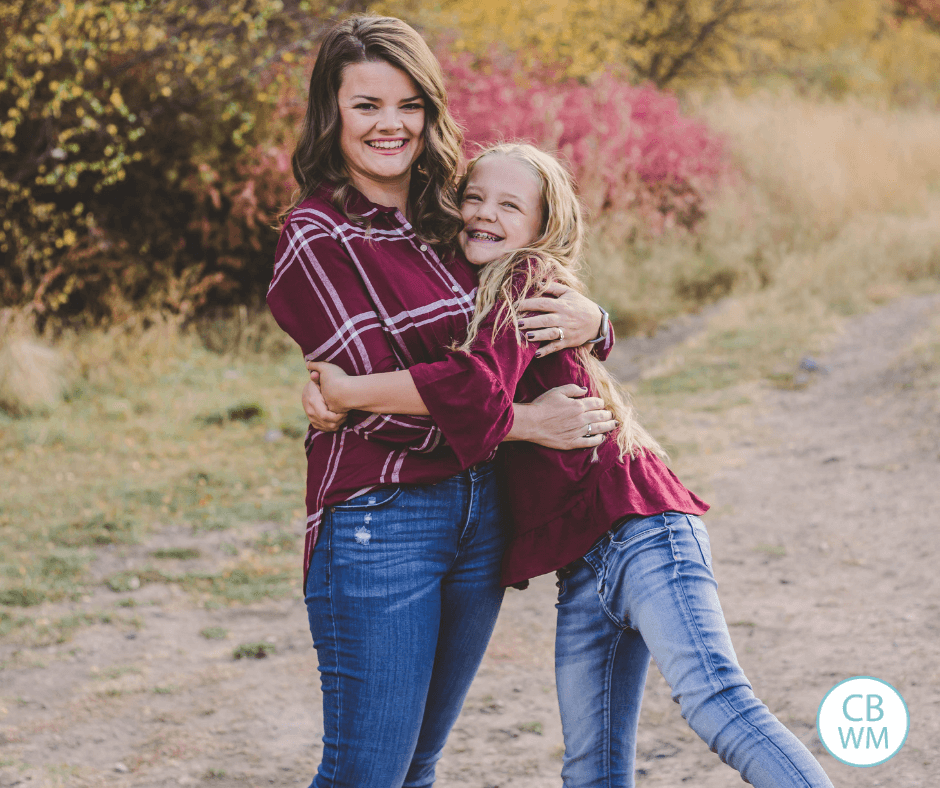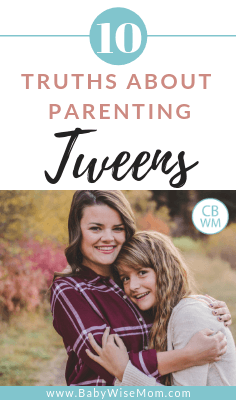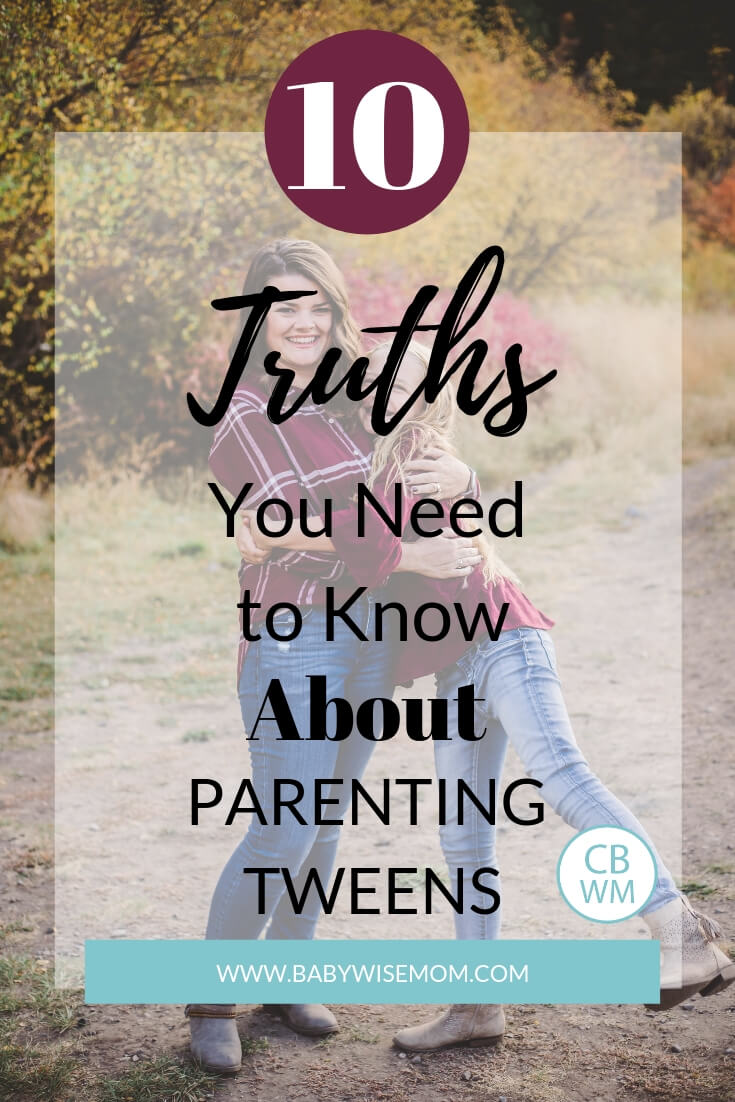10 Truths About Parenting Tweens You Should Know. What to expect when parenting tween girl or parenting tween boy. Also known as preteen years.

The tween years are a time where a lot of change happens. As you are leaving the years of parenting a child (ages 5-8 years old), you are leaving a time of relative calm. Tween years do not have to be much different, but there are a lot of phsyical and mental changes. Your tween will feel more grown up and will want to be treated that way. Here are ten truths about parenting a tween.
Post Contents
- The Relationship Evolves
- Peer Relationships Gain Importance
- Puberty Starts (or continues)
- Parents Need to Stay Engaged
- Parents Need to Allow Room for Failure
- Logic Becomes a Thing
- Tweens Need More Freedom
- Tweens Should Not Have Social Media Accounts
- Tweens Still Like Affection and Time with Parents
- You are About Half Way
- Related Tween Posts
The Relationship Evolves
During this tween, or preteen, stage, your tween child relationship will evolve. You move from being an authority to being an influencer. You don’t have the ability to govern everything your tween does, and you shouldn’t try to take it. This doesn’t mean you hand over all control and drop all house rules. It means you need to recognize your shifting role and adjust to it.
Your tween child may have always wanted you to walk her to class the first day of school. She has always given you a big hug at the door or in the classroom and said good-bye. Your tweenager might start to say, “Nah. I am good. I can walk inside by myself” and insist you stay in the car. These type of situations are all normal and nothing to be offended nor worried by.
This doesn’t mean your tween will cut all ties, but the scissors are out.
Harmony shared: “I love how my relationship with my preteen is evolving. I’m still the parent. I still have authority. But we can talk things out (sometimes) rationally. Their brains haven’t yet turned completely to mush, so they’re still smart, just emotionally charged. We can laugh and tease each other in a way that just doesn’t work with younger kids.
We’re learning that she likes to argue about everything.. so teaching to think through the importance of matters has been necessary.
It’s tough watching the start of the struggle to grow up. Mine still love to play on playgrounds and with toys, but are starting to notice that their peers aren’t so much.”
Peer Relationships Gain Importance
As your tween is trying to establish a bit more independence from you, he/she will start to pay more attention to peers. Your tween might start to care more about fitting in with peers. Your tween will notice what others wear, what they do, what they read, and what they enjoy. They will care more about matching their peers in their likes and dislikes.
Tween years are a great time to practice friendship skills. You can be a great voice of reason for your child. She is trying to establish some independence, but tweens typically still respect mom and dad as major authority figures in life.
This is a great time for you to teach your child to be a good friend and be a rational person. When she comes home and tells you Suzy was mean at recess, you might get all mama bear and want to tell her to just ignore Suzy then. Tame your emotions, remember Suzy is a child, and give your child some sound advice on how to be a good person in life. Teach her to respond in grace now so she doesn’t do something regretful in middle school when things get uglier.

Puberty Starts (or continues)
Puberty starts at different ages for all children. Typically, girls start earlier than boys. The start of puberty can be a years before you really notice any real changes.
Your child will start to have changes. The face changes, the body changes, and teeth change. Hair can start to grow. Body odor can be noticeable. Height can come on. For some kids, that will mean weight is added before a growth spurt.
It is important to talk to your child about changes so he/she can be mentally prepared. Don’t make a big deal about things; just speak matter of factly.
For example, when it is time to start wearing deodorant, just bring it up like it is no big deal. It isn’t a big deal. You might be freaking out inside, especially with the first child, but body odor is a fact of life. No need to make it a big thing. Just stay casual and factual. If you remember when you first started having changes, you can share stories about that.
This is a time period to talk to your child about sex and puberty. Make sure you initiate this conversation so your child doesn’t feel the need to go find out about it elsewhere. Don’t make it weird–not a one time “big talk” that you have and walk away from and never discuss again. Make it clear conversations and questions your child has are always welcome.
Parents Need to Stay Engaged
While your relationship is evolving and becoming less of a “do what I say” thing and more of an influential relationship, parents still need to stay engaged in parenting.
Emotions will flow in the tween years. Don’t allow moodiness or disrespect to be a thing. Having hormones is an explanation, but not an excuse.
On Becoming Preteen Wise book states: “The more we respond to an emotion in a certain way, the greater the likelihood that it will develop into a habit” (page 26). If your child is allowed to respond a certain way over and over, that is how the brain will habitually respond in the future. It is important we help guide our preteens to respond to situations in a healthy way.
When Brayden was a tween, he often saw the world in a “half-empty” light. When I recognized this, I had him start keeping a gratitude journal. Every night, he was to write down 3 things he was thankful for. This evolved to him writing what he is thankful for and then writing about his day.
Today, as a teenager, he still writes in his journal each night and includes what he is thankful for. His actions show he recognized a strong benefit of this activity in his life. His has told me how helpful it has been for him.
When your preteen has behaviors that need correcting, do it. This is a much easier time to shape and mold a child than teen years.
Parents Need to Allow Room for Failure
As our children get older, we need to step back and allow our child to have room to fail. This means we need to hand over some responsibility and control.
This can seem scary, but his leads to growth. Also, realize that the best time to practice some independence is now before stakes increase. Once my oldest child went to middle school, I realized how happy I was that I had stepped back over time and allowed him to manage his own school work. I have four children. Reminding all four of them to stay on top of what their teacher requires (on top of everything else a mother has to focus on) gets mind cluttering.
Then enter middle school. My son went from one teacher to six. Those six can change every trimester of school. So he has to track a lot of things. If I had put myself in a position of needing to help him track all of those teachers on top of everything else in the household, I don’t think I could have survived mentally.
My current 9-year-old is in fourth grade this year. Her teacher is a second-year teacher at our school. A friend of mine had a daughter in her class last year. My friend told me early on she wasn’t sure exactly how she felt about the teacher; she didn’t send home notes and communication so parents know all the things going on.
McKenna got this teacher and I have loved this quality in a teacher in the fourth grade year. It isn’t because I don’t love knowing everything; I love it! But I find it very valuable to hand over some of this responsibility to McKenna now. She has three years to practice being in charge of remembering her details of school before she hits those 6 teachers in middle school.
It hasn’t been perfectly smooth. She had a few weeks forgetting to bring home her spelling list to study. She has worked through that and now remembers quite well. It has been a skill she has had worked to develop.
You might have to set some consequences for responsibilities not being met if natural consequences aren’t really there (like take putting shoes away when she gets home from school). That is okay to have some family rules and consequences for neglecting responsibilities!
These are the years to pull-back on the parent bail-outs if you have been a parent who swoops in to save your child and protect from failure. Failure sucks. We don’t like it in our lives, and we like it even less when we see our child hurting. The lessons are invaluable, however.
See Should You Bail Your Child Out for more on this.

Logic Becomes a Thing
Yay for logic! Some children are more logical and this has always been a thing. Some are less logical by nature and this will take longer. For most, this will be a time period when logic can start to drive behavior, reactions, and actions.
Tweens Need More Freedom
The balance of freedom is never an easy thing. Tweens can act out if they have too much freedom, but they can also act out with not enough freedom. Frustration can set in when they aren’t given enough responsibility and control over their lives. Consistently analyze the freedoms your child has, no matter the age, and see if you need to give more or take some back.
Tween age range is typically a time when we need to give more freedoms to children.
Tweens Should Not Have Social Media Accounts
Yes, I am going to say that without qualifying it. Your tween should not have social media accounts.
For most accounts–certainly the big ones most people use–it is against their policies and terms of service to have an account with them until you are at least thirteen years old. If your child has a Facebook or Instagram account before the age of 13, you are violating their terms. That means you or your child lied about the age to set the account up. You can read about the Children’s Online Privacy Protection Rule (COPPA) here.
Beyond the law, more and more research is coming out to support delaying social media for children, tweens, and even younger teenagers. A solid rule at our house is no social media accounts before age 13. If you lie about your age, the law cannot protect you online.
My oldest is currently almost 14 and still does not have a social media account. He never asked once he turned 13. I like it this way. A teenager with a social media account cannot really ever get away from school. Middle school years can be hard, and I like that my kids can leave school and the social games behind them at times. They can escape to the sanctity of the home.
My son hasn’t had a negative experience in middle school. He has a great group of friends who are great, kind kids. I have read about teens and cyberbullying. Perhaps this could have happened to my son, but that isn’t a concern. I just want him to be able to break from it all.
They still need breaks even if there is no drama. They still need to be able to be home and just be.
Think carefully about the cell phone, also. A tween does not need a smartphone on her person. If you feel strongly your child needs a phone, you can get flip phones (or “dumb” phones) to use. They also have watches you can get so your child can reach you and you can reach your child without needing a cell phone.
Follow our journey with our preteens with our Preteen Summaries
Tweens Still Like Affection and Time with Parents
Your tween is changing and maturing. He or she still will benefit and enjoy physical affection and time with parents. Do not stop doing things like tucking in, kissing, and hugs, unless your child requests it. If you pull back, your child will notice and wonder why. Take your child’s lead on these things. Walk your child into the school until he asks you not to (just be sure your relationship is such your child feels comfortable asking for you to stop once he is ready).
While peers are gaining influence in your tweens life, you are still number one as a parent. Give time to the relationship and build it up even stronger than it is.
You are About Half Way
If you figure your child will move out around the age of 18 to head to college, at age 9, you are halfway in your parenting that child under your roof. This can be a scary realization and really make you step back and analyze what you have done to prepare your child for the real world so far and what you still need to do. You will probably also make a list of all the fun things you want to do before your child leaves!
It seems like your tween was just a baby. You can remember it so well, but your tween is a lifetime away from that. Tween years are a time for a lot of adjustment, change, and preparation for the teenage years ahead.
Related Tween Posts
- 9 Things to Know About Having Older Children
- Sleep Tips and Needs for Teens and Tweens
- When Can a Child Stay Home Alone?
- 22 Chapter Books for PreTeens {Ages 8-12}
- 45 Questions to Get Your Child Talking
- How to Correct Your Preteen
- How to Establish Safe Media Standards For Your Family
- Independent Playtime for the School-Aged Child
- Sleep Needs and Difficulties for 7-12 Year Olds
- Everything You Need for Your Daughter’s First Period
- Best Tween Gift Ideas They ACTUALLY Want!

when you mention freedoms, that’s always such a grey area for me. I always wonder if it’s age appropriate…I realize when younger the question about freedoms and if appropriate, often it was the case of too many vs not enough (it was rarely the latter). But you said it can shift and this is the age of giving more freedoms. Can you give some examples of what may be appropriate (and knowing that there is a difference between a 10 year old and 12 year old of course…..it makes sense the latter would have more, the former less). Anyways just wondering if you could expound a bit on that, of course knowing that this is all general and it varies based on each child and their development. Thanks! (PS I have found with my oldest she is very emotional! That’s been the biggest thing so far……. At times it’s comical. My hubby and I wonder if it’s a precursor to the teenage years or what, hopefully it won’t be worse!:)
Freedoms with older kids is super, super tricky. It is much easier to generalize freedoms with 2-3 year olds than a preteen. Preteens can vary significantly in maturity level. Think of preteens who are starting puberty at different times; the brain is developing differently for each of them. You also have freedoms up for question that can vary greatly depending on where you live. Where it might be great in one neighborhood to allow certain freedoms, in a different neighborhood in a different state, that freedom might be out of the question.
It is a matter of giving the child more control in life. It can start simple to the child getting to choose the entire outfit of what she wears each day (but you would still want to maintain veto power if needed). It can be the child getting to choose exactly when she goes to sleep, so you allow her to read in her bed until she decides to sleep…that is a freedom I would offer in older preteen or younger teen years.
You might have a preteen being allowed to walk home from school without a parent. Your preteen might be allowed to stay late at a friend’s house or stay up late sometimes at home on weekends.
You want your child to learn to manage his/her life and part of that is taking steps to be over it. The trick is deciding what is appropriate and what isn’t for your child as a unique individual.